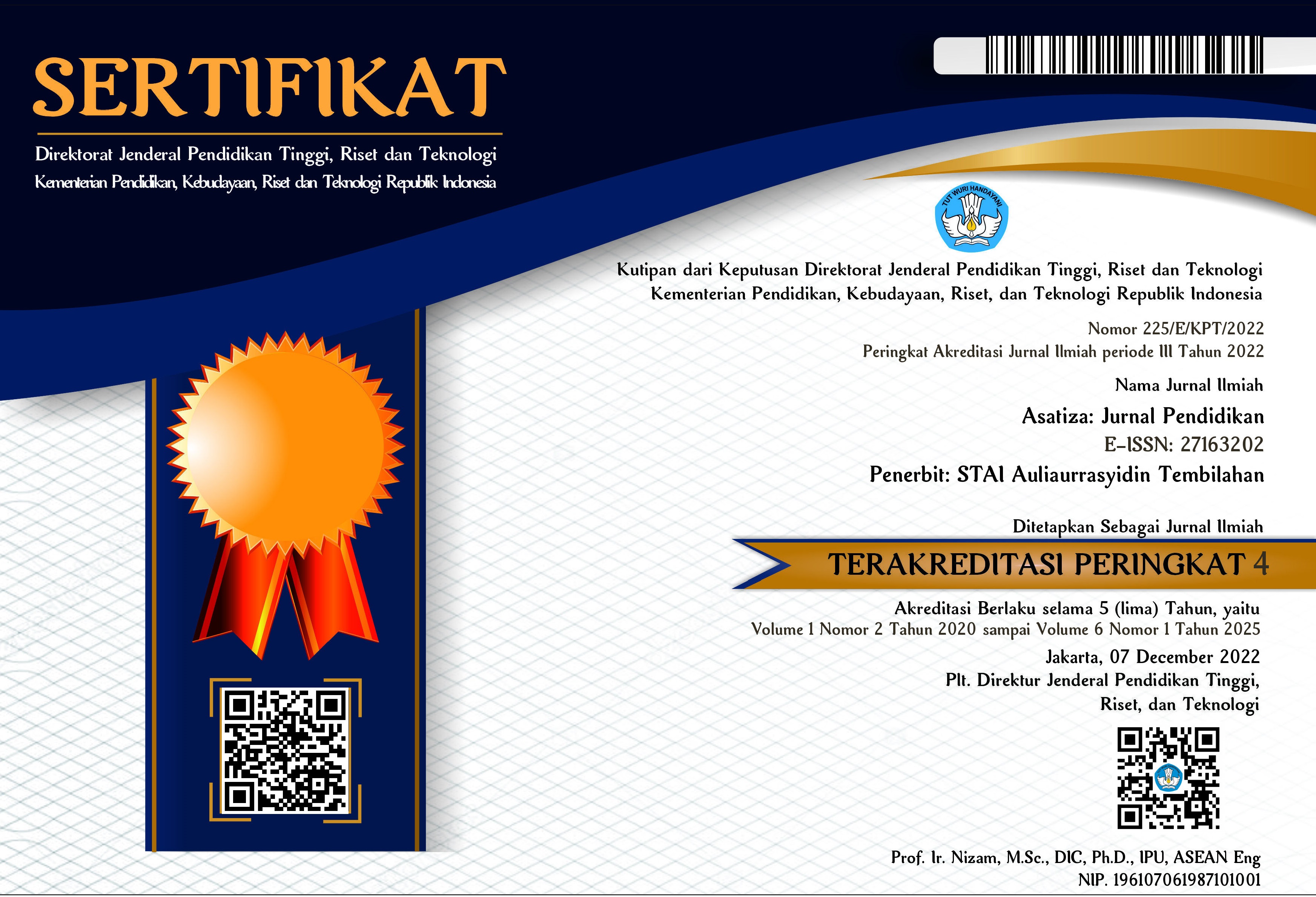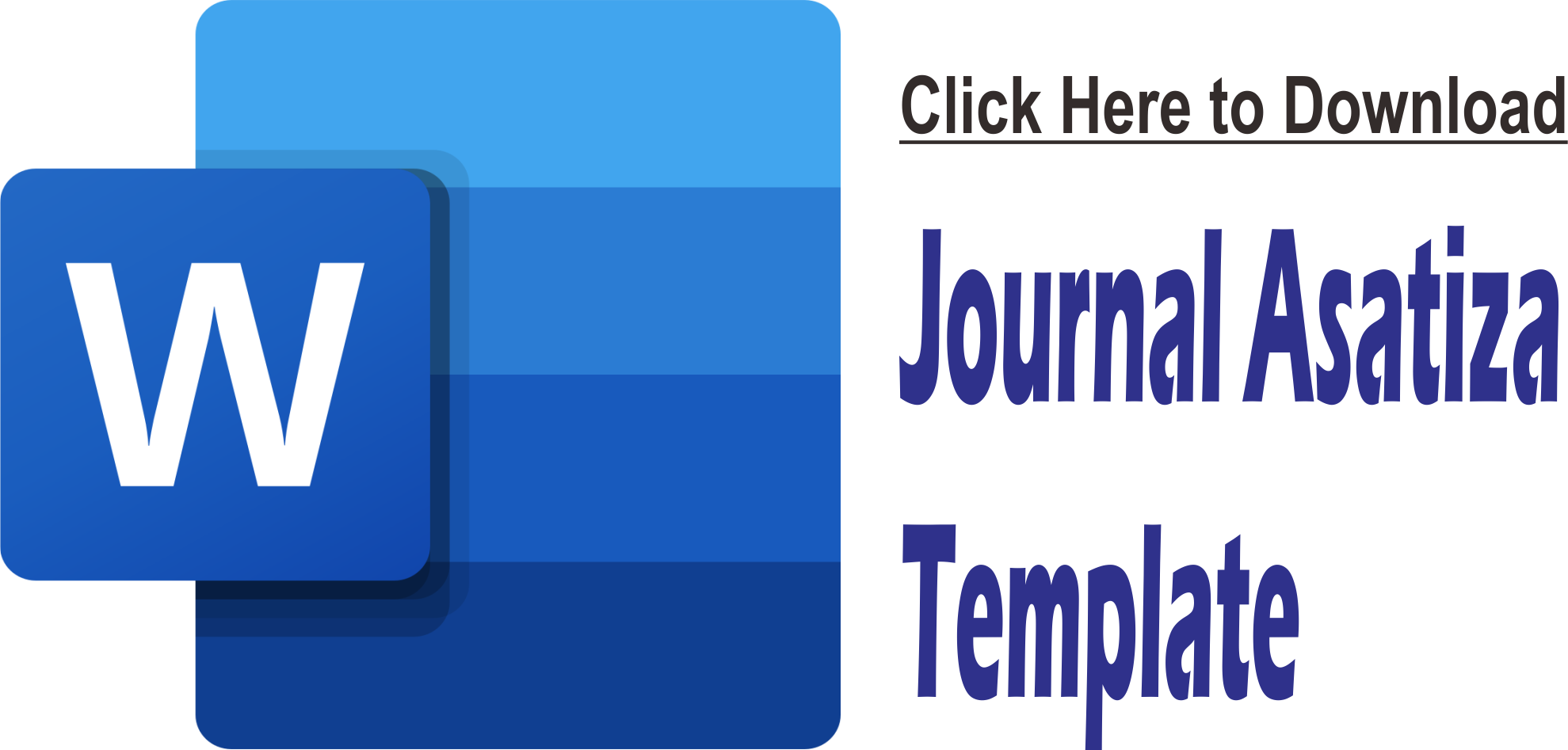Pengembangan Kurikulum Ma’hadi dalam Meningkatkan Kompetensi Mahasiswa
DOI:
https://doi.org/10.46963/asatiza.v5i1.1572Keywords:
Ma'hadi Curriculum, Competencies, StudentsAbstract
Student Islamic boarding schools are unique and distinctive educational institutions, both in terms of subject (mahasantri) and objects (curriculum and activities). With modernization, the IDIA Prenduan ma'hadi Islamic boarding school provides an adaptive response to adopting a modern education system. This is done by trying to maximize management and curriculum management to produce students who not only have academic knowledge but also instill character values. This research aims to examine the characteristics of the Ma'hadi curriculum and its implications for student character formation. This type of research, field research, in principle relies more on descriptive aspects of data obtained from the field. The results of this research show that the Ma'hadi Islamic boarding school has an educational program that is prepared by itself, where this program contains an educational process that lasts throughout the day in one condition in the dormitory. While IDIA Prenduan uses modern learning methods (tajdid), Ma'hadi Islamic Boarding School has updated its education system with a modern education model where the entire education system starting from teaching techniques, lesson materials, facilities and infrastructure are designed based on the modern education system.
Downloads
References
Afgani, J. (2019). Kurikulum dan Pengembangannya. 1-34. Jakarta:UT Jakarta.
Arifin, Z. (2018). Manajemen Pengembangan Kurikulum Pendidikan Islam: Teori dan Praktik. Yogyakarta: Almuqsith Pustaka.
Arifai, A. (2018). Pengembangan Kurikulum Pesantren, Madrasah Dan Sekolah. Raudhah Proud To Be Professionals : Jurnal Tarbiyah Islamiyah, 3(2), 13-20. https://doi.org/10.48094/raudhah.v3i2.27
Bahri, S. (2017). Pengembangan Kurikulum Dasar dan tujuannya. Jurnal Ilmiah Islam Futura (JIIF). 11(1), 15-34. http://dx.doi.org/10.22373/jiif.v11i1.61
Fajri, K. N. (2019). Proses Pengembangan Kurikulum. Islamika: Jurnal Keislaman dan Ilmu Pendidikan STIT Palapa Nusantara Lombok NTB, 1(2), 35-48. https://ejournal.stitpn.ac.id/index.php/islamika
Huda, N. (2019). Pendekatan–pendekatan Pengembangan Kurikulum. Qudwatuna, 2(2),175-197. https://ejournal.alkhoziny.ac.id/index.php/qudwatuna/article/view/21
Idi, A. (1999). Pengembangan Kurikulum: Teori dan Praktik. Jakarta: Gaya Media Pertama.
Kurniyati, A., & Majid, A. (2021). Internalisasi Pendidikan Emansipatoris Di Perguruan Tinggi Pesantren. Jurnal Inovasi Penelitian, 1(11), 2333-2342. https://doi.org/10.47492/jip.v1i11.493
Kuswandi, I. (2017). Logika Kebahagiaan Mahasantri di Pesantren (Studi Kasus Di Kampus IDIA Prenduan Sumenep Madura). Al-Balagh: Jurnal Dakwah Dan Komunikasi, 2(2), 191–208.https://ejournal.uinsaid.ac.id/index.php/al-balagh/article/view/992
Muhtifah, L. (2016). Pola Pengembangan Kurikulum Pesantren Kasus Al-Mukhlishin Mempawah Kalimantan Barat. Jurnal Pendidikan Islam UIN Sunan Gunung Djati, 27(2), 203-222.https://journal.uinsgd.ac.id/index.php/jpi/article/view/507
Mustofa, M. B., & Wuryan, S. (2019). Dakwah Moderasi di Tengah Pandemi Covid 19. Mau'idhoh Hasanah: Riset, 2(2), 22-32. https://doi.org/10.47902/mauidhoh.v1i2.71
Nasution, S. W. R., Nasution, H. N., & Fauzi, R. (2022). Dasar-dasar Pengembangan Kurikulum. Pekalongan: Penerbit NEM.
Nurul Sovinah, Ratna Sari, Risti Maulidaini, Renni, Siti Hasbaina Belti, Soleha, Syamsidah Lubis, Yumna Hamka (2022). Pengembangan Kurikulum. Riau: Dotplus Publisher.
Saputra, M., Na’im, Z., Nugroho, P., Maula, I., Budianingsih, Y., Hadiningrum, L. P., & Ahyar, D. B. (2022). Pengembangan Kurikulum Pendidikan Agama Islam. Pidie: Yayasan Penerbit Muhammad Zaini.
Tolib, A. (2015). Pendidikan di Pondok Pesantren Modern. Risâlah, Jurnal Pendidikan dan Studi Islam, 2(1),60-66. https://jurnal.faiunwir.ac.id/index.php/Jurnal_Risalah/article/view/12
Downloads
Published
Issue
Section
License
Copyright (c) 2024 Liqo’ Sa’idatuts Tsalits, Athiyyaturrahmah Athiyyaturrahmah, Siti Aisyah

This work is licensed under a Creative Commons Attribution-ShareAlike 4.0 International License.
Authors who publish with this journal agree to the following terms:
1. Copyright on any article is retained by the author(s).
2. The author grants the journal, right of first publication with the work simultaneously licensed under a Creative Commons Attribution shareAlike 4.0 International License that allows others to share the work with an acknowledgment of the work’s authorship and initial publication in this journal.
3. Authors are able to enter into separate, additional contractual arrangements for the non-exclusive distribution of the journal’s published version of the work (e.g., post it to an institutional repository or publish it in a book), with an acknowledgment of its initial publication in this journal.
4. Authors are permitted and encouraged to post their work online (e.g., in institutional repositories or on their website) prior to and during the submission process, as it can lead to productive exchanges, as well as earlier and greater citation of published work.
5. The article and any associated published material is distributed under the Creative Commons Attribution-ShareAlike 4.0 International License











2.png)



